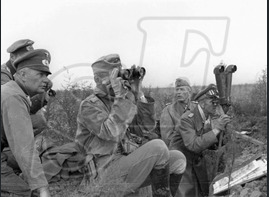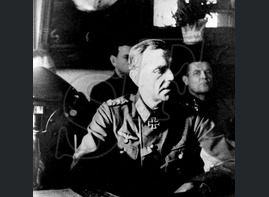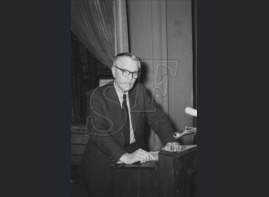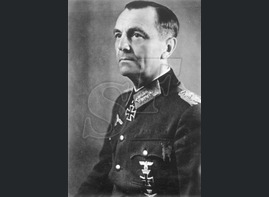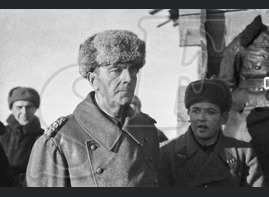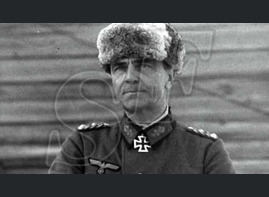Friedrich Wilhelm Ernst Paulus (23 September 1890 – 1 February 1957) was an officer in the German military from 1910 to 1945. He attained the rank of Generalfeldmarschall (field marshal) two hours before surrender in World War II, being best known for commanding the Sixth Army in the Battle of Stalingrad (August 1942 to February 1943). He led the successful advance toward the city of Stalingrad and the less successful attack in 1942 (part of Case Blue, June to November 1942) stopped by the Soviet counter-offensives during the 1942–1943 winter. The battle ended in disaster for Nazi Germany when Soviet forces encircled and defeated about 265,000 personnel of the Wehrmacht, their Axis allies, and the anti-Soviet volunteers. Of the 107,000 Axis servicemen captured, only 6,000 survived captivity and returned home by 1955.
On 5 January 1942, after German Sixth Army's commander Field Marshal Walther von Reichenau, Paulus' patron, became commander of the entire Army Group South, Paulus, who had never commanded a larger unit than a battalion prior to this time, was promoted to General der Panzertruppe and became commander of the Sixth Army. However, he only took over his new command on 20 January, three days after the sudden death of Reichenau, leaving him on his own and without the support of his more experienced sponsor.
Paulus led the drive on Stalingrad during that summer. His troops fought the defending Soviet troops holding Stalingrad over three months in increasingly brutal urban warfare. In November 1942, when the Soviet Red Army launched a massive counter-offensive, code named Operation Uranus, Paulus found himself surrounded by an entire Soviet Army Group.
Paulus followed Adolf Hitler's orders to hold his forces' position in Stalingrad under all circumstances, despite the fact that he was completely surrounded by strong Soviet formations. Operation Winter Storm, a relief effort by Army Group Don under Field Marshal Erich von Manstein was launched in December. Following his orders, Paulus prepared to cooperate with the offensive by trying to break out of Stalingrad. In the meantime, he kept his entire army in fixed defensive positions. Manstein told Paulus that the relief would need assistance from the Sixth Army, but the order to initiate the breakout never came. Paulus remained absolutely firm in obeying the orders he had been given. Manstein's forces were unable to reach Stalingrad on their own and their efforts were eventually halted due to Soviet offensives elsewhere on the front.
Kurt Zeitzler, the newly appointed chief of the Army General Staff, eventually got Hitler to allow Paulus to break out—provided they continue to hold Stalingrad, an impossible task.
For the next two months, Paulus and his men fought on. However, the lack of food, ammunition, equipment attrition and the deteriorating physical condition of the German troops gradually wore down the German defence. With the new year Hitler promoted Paulus to colonel-general.

